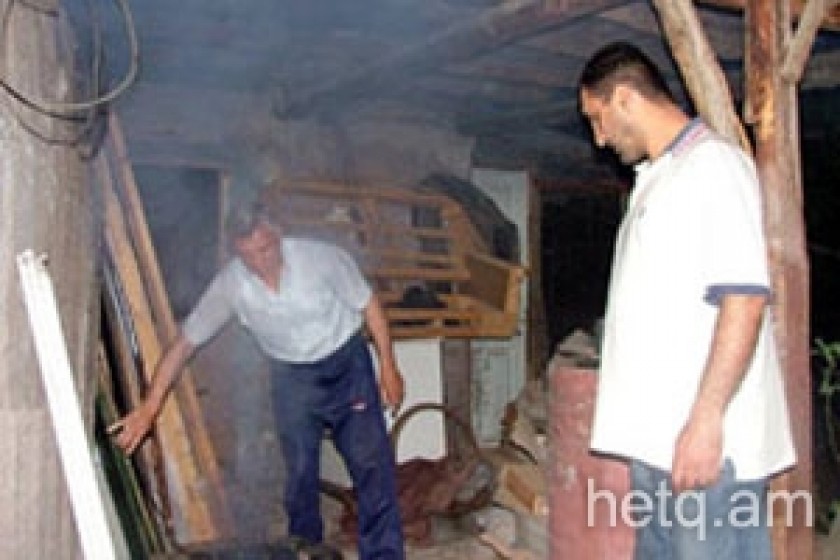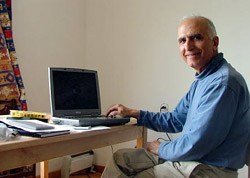
“Drop by Drop A Lake Will Be Created”
Furniture-making brothers Garik and Artyom Babajanyan needed five hundred dollars to buy a truck.
Canadian-Armenian Antoine Terjanyan offered to give them the money without them having to pay it back on the sole condition that they would quit smoking. If the brothers started smoking again, they would have to immediately return the money.
They requested a few days to think about the offer and finally accepted. They badly needed the truck to move their material and furniture. Also, they had wanted to quit smoking for a long time.
The Babajanyan brothers are not the only ones who have been made this strange offer of “credit”. Everybody in Yeghegnadzor knows the house of Antoine Terjanyan, or as they call him there, “the Canadian”. Terjanyan is engaged in philanthropy in Yeghegnadzor – more specifically, he helps the development of small businesses.
 Terjanyan is a Canadian-Armenian whose parents were originally from Erzrum. Like all Armenians in the Diaspora, Antoine dreamed of visiting Armenia. In 1986, he decided to finally fulfill his dream, bringing his wife and two children along. He had already bought tickets and made all the arrangements for his trip, when the disaster at Chernobyl occurred.
Terjanyan is a Canadian-Armenian whose parents were originally from Erzrum. Like all Armenians in the Diaspora, Antoine dreamed of visiting Armenia. In 1986, he decided to finally fulfill his dream, bringing his wife and two children along. He had already bought tickets and made all the arrangements for his trip, when the disaster at Chernobyl occurred.
“We would constantly get news that the truth was being covered up, that in reality all sorts of horrible things had happened there. We were scared for the children and decided not to come,” said Antoine, “Then the earthquake happened, the Karabakh war, the cold and dark years. We decided to send money as aid to Armenia instead of coming ourselves. The years went by. In 2001, I was riding a bicycle to work when the brake wire suddenly snapped out and jutted into the wheel. It was a very bad accident. When I came to, I thought I was going to be disabled for life. I realized that life is short, and that if you have a dream you should act to fulfill it.”
This time, Antoine did not want to come to Armenia just as a tourist. “Sitting in Canada, we would always criticize the situation in Armenia. I thought, ‘I'm an expert in development. I should go and do something useful rather than criticize Armenia.'”
Having heard about the newly established Armenian Volunteer Corps, Antoine contacted them. The Corps had been established by Jason Demirjyan, the only Armenian who had enrolled in the Peace Corps. The principal behind the organization was the same, the only difference being that the volunteers coming to Armenia were Diasporan Armenians, not Americans.
Like in the Peace Corps, the volunteers had to learn Armenian in this case as well and live with an Armenian family for at least the first month of their stay, getting a taste of the conditions in which an average Armenian lives.
Antoine and his Scottish wife Sheila left their work in Canada and came to Armenia for a year.
“It was mandatory to learn Armenian,” said Antoine, “I spoke Western Armenian, of which Sheila knew a little as well. Now she speaks Eastern Armenian fluently. When I talk to my children on the phone they say, ‘Speak Armenian, we can't understand what you're saying.' I tell them to learn this language, because it is now the language of their mother. We lived in Yerevan with a host family that taught us the real meaning of hospitality. Thanks to them, we fell in love with Armenia.”
One of Antoine's initiatives was to help a beekeeper in Yeghegnadzor sell his honey in Yerevan – he helped make labels and advertise the product. They grew close and Antoine visited him in Yeghegnadzor once. They saw a house for sale there and, fifteen minutes later, had bought it for themselves. Now, they spend a part of the year there, while the rest of the time they “go to other countries, making money to be spent in Armenia.”
“There is no nature like the nature in Yeghegnadzor, no mountains like the mountains there,” said Antoine, “After we bought the house, we got the idea of turning it into a Bed and Breakfast for tourists. There are many houses doing that now, but five years ago there were none. Everything was centered in Yerevan.”
Antoine also helped some of his neighbors financially, allowing them to make B&Bs of their houses as well. He offers loans with a certain period for repayment – the debtors repay in installments and without interest. One night in these houses costs around 20 Euros, which is good income for the people of Yeghegnadzor.
Antoine helped Arsen Vardanyan in the sale of rose-hip juice. He also brought thermal-resistant paper for Hazarapet Nazaryan, who sells thyme tea. Now they are working on exporting the thyme tea.
He has also started a new venture with the Babajanyan brothers. They are growing Canadian plane trees in Yeghegnadzor, to use them later in furniture. They have already planted around 800 plane trees, which can be used in seven years to make furniture.
The workshop of the Babajanyans was enlarged recently, again thanks to a loan from Antoine. Fifteen people now work there and make a decent salary.
“People are very proud here, nobody has come to ask me for money, they come to ask for work. What I am doing is nothing special,” said Antoine, “It's just a drop. But drop by drop, a lake will be created.”
Unemployment is a big problem in Yeghegnadzor. In Soviet times, there were textile factories, canneries and electrical gadget plants here. Now, only the wine factories and railway line plants remain.
Antoine prepared the Yeghegnadzor Primary Aid program, which he was preparing to implement using his own finances and those of other donors willing to help.
The program makes specific mention of problems with water as well as costumes and transport costs for the Yeghegnadzor dance troupe to perform in festivals plus the lack of computers in the Yeghegnadzor Pedagogical University.
The annual tuition fee of each student in the university is around 300 Euros, which many families cannot afford. Antoine suggested that donors should act as sponsors for the students.
The majority of Armenians lives on aid sent from relatives abroad. Those who have no relatives in other countries are in the worst condition of all. Antoine proposed that foreigners and Armenians in the Diaspora become the “relatives” of such families – a monthly transfer of 100 Euros, in his opinion, would be enough to support a family of four.
Antoine has also appealed to elderly Armenians in the Diaspora to leave the retirement home, if they are staying in one, and move to Armenia. “Using the money they pay to stay in retirement homes, they can live like kings here in Armenia,” he said confidently.
 Videos
Videos Photos
Photos
Write a comment